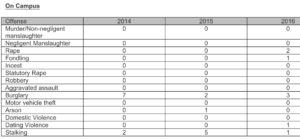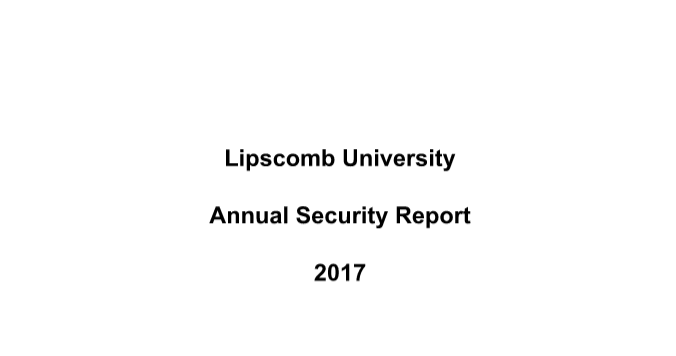Two cases of on-campus rape were reported in the annual security report for 2016 that was emailed to the student body this week.
Lipscomb spokeswoman Kim Chaudoin said that all involved parties were college-age students (i.e. faculty and staff were not involved), and the perpetrators are no longer enrolled at Lipscomb and both incidents occurred in Nashville — not in any of the study abroad locations.
“The police were not called in for either of the [rape] cases,” Chaudoin said. “For whatever reason, they may or may not choose to call the police. It’s possible that in a date-rape situation, the victim may not want to get their date in trouble. In both [rape] cases, the university worked swiftly to investigate and take disciplinary action.”
 The crime report comes out every year because of the Clery Act, which was created to dictate to colleges and universities how to respond to crisis situations, and has expanded to include Title IX.
The crime report comes out every year because of the Clery Act, which was created to dictate to colleges and universities how to respond to crisis situations, and has expanded to include Title IX.
Title IX protects Lipscomb and the students involved from disclosing any fine details about the incidents to the public. Kathy Hargis and Lipscomb’s Title IX team investigate all reported incidents before determining what steps to take next.
Chaudoin emphasized that the Clery Act definition of rape encompasses more than the traditional definition of rape.
“This year [the Clery Act] changed the way some crimes are reported,” Chaudoin said. “The definition [of rape] has broadened a bit, so some instances may not fit the traditional definition of rape.”
In the emailed report, the definition of rape is listed as: “The penetration, no matter how slight, of the vagina or anus with any body or object, or oral penetration by a sex organ of another person, without the consent of the victim.”
Chaudoin noted that she wants to assure everyone that the safety of students is very important to Lipscomb, and they want students to report what they see.
“We also think that people are more confident in reporting [rape],” she said. “We’ve educated students on how to report incidents and believe people are more comfortable in doing so. We want to make our campus as safe as possible.”
According to Chaudoin, if the survivor or victim is not a minor, it is “totally up to the survivor” if they choose to report to the police or not, but Lipscomb’s Title IX officer tries to provide them with information to hopefully help them in that decision — not persuading them either way but informing them what options there are for reporting or for not reporting it. Chaudoin added that if it is a true sexual assault, she encourages them to go to the hospital and have a sexual assault exam.
However, if the victim is a minor, she noted that this would likely fall into the statutory rape classification and would be reported to authorities.
The annual emailed report also included statistics from 2014 and 2015, in which no cases of rape were reported. In addition to the two reports of rape in 2016, there were three burglary cases, one case of fondling, one dating violence case and one stalking case.
Down the street, Belmont University also released its statistics for the past year, with six cases of on-campus rape reported, five burglary cases, two cases of fondling, two dating violence cases and nine stalking cases.
If anyone is walking back to his or her dorm or vehicles after dark and would like a campus safety officer to accompany them to ensure their safety, they can call 615- 966-7600 and a campus safety officer will meet them at their car or dorm. Students also have access to an anonymous reporting site if they want to report any incident.
“We’re in a great part of town — hopefully it means that our students have good situational awareness,” Chaudoin said. “Part of being safe is determined by your own actions.”

